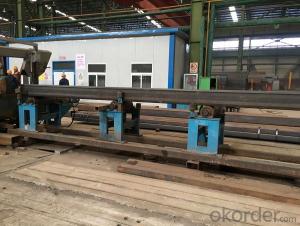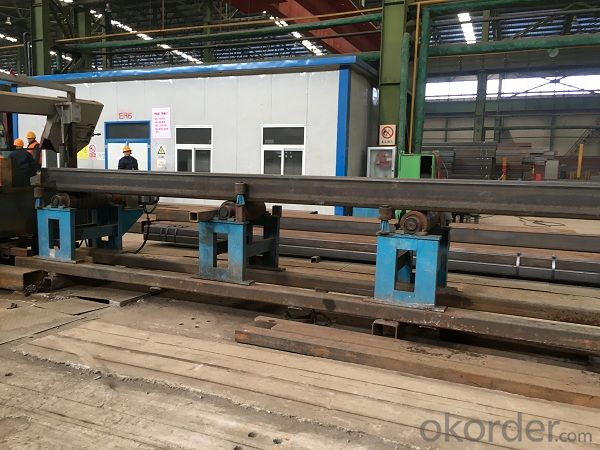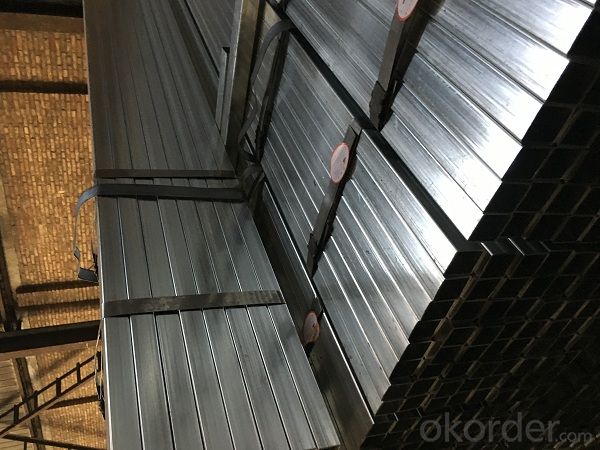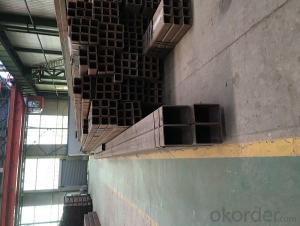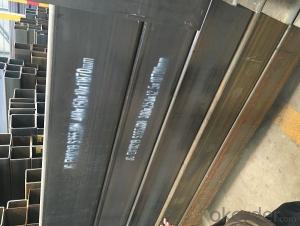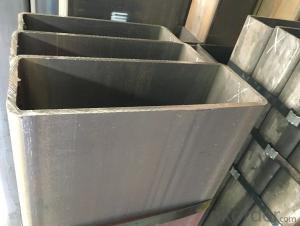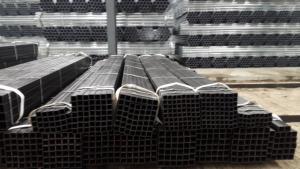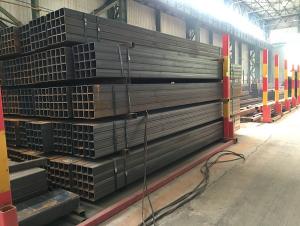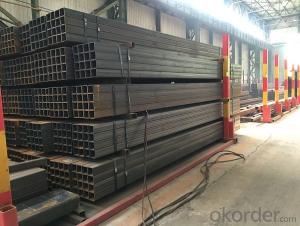Welding square rectangular pipe for construction
- Loading Port:
- Tianjin
- Payment Terms:
- TT OR LC
- Min Order Qty:
- 20 m.t.
- Supply Capability:
- 15000 m.t./month
OKorder Service Pledge
OKorder Financial Service
You Might Also Like
Specification
Welding square rectangular pipe for construction
1、 Welding square rectangular pipe for construction
Square tube, square tube is a kind of call and rectangular tube, is equal and not equal to the length of steel pipe. Is the strip through the process of processing roll system. In general is the strip through the demolition of the package, flat, curly, welded to form a circular tube, and then rolled into a square tube and then cut into a square tube and then cut into the required length.
2、 Welding square rectangular pipe for construction
• High manufacturing accuracy
• High strength
• Small inertia resistance
• Strong heat dissipation ability
• Good visual effect
• Reasonable price
3、 Welding square rectangular pipe for construction
Standard | GB, DIN, ASTM |
Grade | 10#-45#, 16Mn 10#, 20#, 45#, 16Mn |
Thickness | 1.5 - 25 mm |
Section Shape | Square and rectangular |
Outer Diameter | 20*20 mm-------400*400mm 20*30mm*300*500mm |
Place of Origin | Tianjin, China (Mainland) |
Length | 3-12M |
Outer Diameter | 20*20 mm-------400*400mm 20*30mm*300*500mm |
Grade | 235B 345B |
Standard | ASME, ASTM |
1) Material:(ASTM A 106/A53 GRB.API5LGRB,GB,235B,345B
2) Specification range:OD: 20*30mm----300*500mm 20*20 mm---400*400mm ,WT: 1.5 - 25 mm ,length:3-12m or according to the requirement of clients.
3) Excutive standards:GB,ASME API5L.ASTM A 106/A53,Despite of the above
4) Surface:black lacquered,varnish coating or galvanized.
5) Ends:Beveled or square cut ,painted.
6) Packing:bundles wrapped with strong steel strip,seaworthy packing.
4、Packaging & Delivery
Packaging Details: | seaworthy package,bundles wrapped with strong steel strip |
Delivery Detail: | 15-30days after received 30%TT |
5、 Welding square rectangular pipe for construction
①How is the quality of your products?
Our products are manufactured strictly according to national and internaional standard, and we take a test
on every pipe before delivered out. If you want see our quality certifications and all kinds of testing report, please just ask us for it.
Guaranteed: If products’ quality don’t accord to discription as we give or the promise before you place order, we promise 100% refund.
②How about price?
Yes, we are factory and be able to give you lowest price below market one, and we have a policy that “ for saving time and absolutely honest business attitude, we quote as lowest as possible for any customer, and discount can be given according to quantity”,if you like bargain and factory price is not low enough as you think, just don’t waste your time.Please trust the quotation we would give you, it is professional one.
③Why should you chose us?
Chose happens because of quality, then price, We can give you both.Additionally, we can also offer professional products inquiry, products knowledge train(for agents), smooth goods delivery, exellent customer solution proposals.Our service formula: good quality+good price+good service=customer’s trust
SGS test is available, customer inspection before shipping is welcome, third party inspection is no problem.
6、 Welding square rectangular pipe for construction
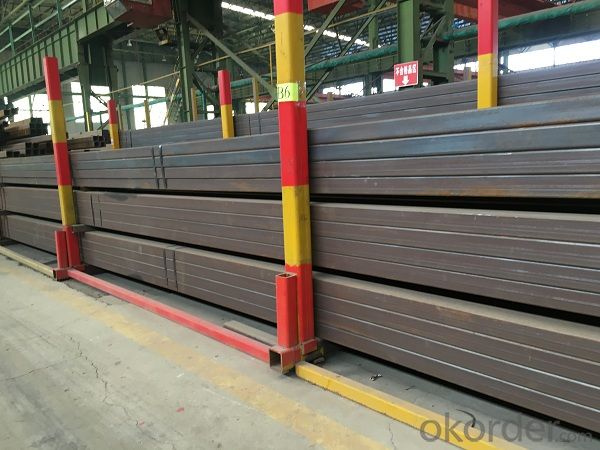
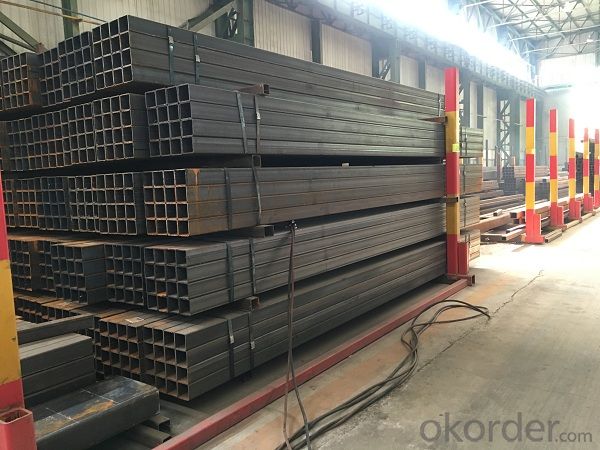
- Q: How are steel pipes transported and stored?
- Steel pipes are typically transported using trucks, trains, or ships, depending on the distance and quantity. These pipes are often stacked and secured with straps or chains during transportation to prevent any movement or damage. When it comes to storage, steel pipes are commonly stored in outdoor yards or warehouses. They are usually organized in neat rows or stacked on racks to maximize space and facilitate easy access. Additionally, pipes may be covered with weather-resistant materials to protect them from rust or corrosion during storage.
- Q: Can steel pipes be used for hydropower systems?
- Yes, steel pipes can be used for hydropower systems. Steel is a durable and strong material that can withstand high pressure and corrosion, making it suitable for carrying water or other fluids in hydropower systems. Additionally, steel pipes can be customized to different sizes and shapes, allowing for efficient water flow and distribution within the system.
- Q: How are steel pipes protected against external impact or mechanical damage?
- Various methods are employed to protect steel pipes from external impact or mechanical damage. One commonly utilized technique involves applying a protective coating onto the pipe's surface. This coating acts as a barrier, preventing direct contact between the pipe and external objects or forces. Coatings such as epoxy, polyethylene, or polyurethane are frequently chosen due to their excellent resistance to impact and abrasion. Another method of protection involves the use of pipe supports or clamps. These supports are positioned at regular intervals along the pipe's length, ensuring stability and minimizing excessive movement or vibration. They help distribute the load and absorb any external impacts, thus reducing the risk of mechanical damage. Additionally, steel pipes can be reinforced by wrapping them with materials like fiberglass, carbon fiber, or kevlar. These reinforcement materials provide an extra layer of strength and durability, enhancing the pipes' resistance to external impact and mechanical damage. Furthermore, burying the pipes underground or installing them within protective casings can offer an additional layer of protection. This measure shields the pipes from direct contact with external objects, reducing the potential for damage caused by accidental impacts or environmental factors. In conclusion, a combination of protective coatings, supports, reinforcements, and appropriate installation methods ensures that steel pipes are safeguarded against external impact or mechanical damage. This effectively extends their lifespan and maintains their structural integrity.
- Q: What are the common problems or issues faced with steel pipes?
- Common problems or issues faced with steel pipes include corrosion, leakage, cracking, and scaling. Corrosion can occur due to exposure to moisture, chemicals, or environmental factors, leading to reduced structural integrity and potential leaks. Leakage can result from faulty welds, damaged seals, or pipe degradation. Cracking can occur due to excessive stress, temperature fluctuations, or manufacturing defects, compromising the pipe's strength. Scaling or buildup of mineral deposits can also restrict flow and affect performance. Regular inspection, maintenance, and proper coating or lining can help mitigate these issues.
- Q: How can galvanized steel tubes be painted on the surface?
- Galvanized parts are nonferrous metals, ferrous metals are black, all metal adhesion is poor;
- Q: What is the role of steel pipes in HVAC systems?
- Steel pipes are crucial components in HVAC systems as they are used to transport hot and cold water throughout the system. They provide a durable and reliable means of distributing heat or cooling energy to various parts of a building. Steel pipes are known for their high strength and resistance to corrosion, making them an ideal choice for HVAC applications.
- Q: Can steel pipes be used for fencing or railing?
- Yes, steel pipes can definitely be used for fencing or railing purposes. Steel pipes are known for their durability, strength, and resistance to corrosion, making them a popular choice for construction projects like fencing and railings. They provide a sturdy and long-lasting solution for securing properties or creating barriers, while also offering an aesthetically pleasing and modern look.
- Q: How are steel pipes used in high-rise buildings?
- Steel pipes are used in high-rise buildings for various purposes, including structural support, water supply, and sewage disposal. They are commonly used as columns and beams to provide strength and stability to the building's framework. Additionally, steel pipes are utilized for plumbing systems, carrying water from the ground floor to the upper levels, as well as facilitating the disposal of wastewater. Overall, steel pipes play a crucial role in ensuring the safety and functionality of high-rise buildings.
- Q: How to make the internal tooth of the steel pipe?
- At present, in our country, 300MW or 600MW or more large capacity sub critical and supercritical thermal power boilers are designed or imported abroad. Membrane internal wall tubes are widely used in membrane water wall.
- Q: What is the difference between steel pipes and ductile iron pipes?
- Steel pipes and ductile iron pipes are both commonly used for plumbing and industrial applications, but there are notable differences between them. The main difference lies in their composition and mechanical properties. Steel pipes are made primarily from iron and carbon, with small amounts of other elements added for strength and corrosion resistance. On the other hand, ductile iron pipes contain a higher percentage of carbon and small amounts of other elements like silicon and manganese, which give them improved ductility and resistance to cracking. Consequently, steel pipes are typically stronger and more rigid, suitable for high-pressure applications, while ductile iron pipes offer better flexibility and impact resistance, making them ideal for underground installations and areas prone to ground movement. Additionally, steel pipes are usually more expensive than ductile iron pipes due to their higher strength and corrosion resistance.
Send your message to us
Welding square rectangular pipe for construction
- Loading Port:
- Tianjin
- Payment Terms:
- TT OR LC
- Min Order Qty:
- 20 m.t.
- Supply Capability:
- 15000 m.t./month
OKorder Service Pledge
OKorder Financial Service
Similar products
Hot products
Hot Searches
Related keywords
